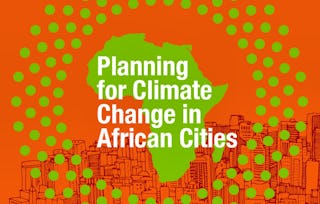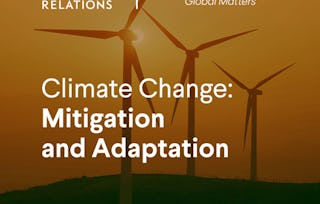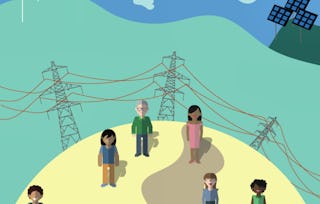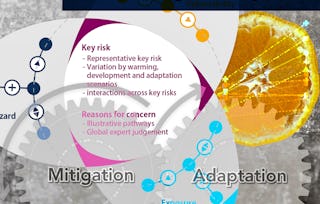This course explores why climate change adaptation is important globally and in the African context. Africa is considered to be one of the most vulnerable regions to climate change. Historically, climate-related hazards such as drought, flooding, pest and disease outbreaks, coastal storms, and heat waves have had devastating impacts on people and the environment in which they live. Often the damage knocks back progress that has been made in social and economic development, slowing down the achievement of development goals. Climate models suggest that many of these climatic hazards will intensify as the global climate warms. Building resilience to climate risks, through adaptation, is critically important for future development in Africa.

Climate Adaptation in Africa

124 reviews
What you'll learn
Ways of building resilience to climate risks through adaptation by taking into account what is critically important for future development.
New insights into climate adaptation in theory and in practice using cases from Africa and globally.
Skills you'll gain
Details to know

Add to your LinkedIn profile
See how employees at top companies are mastering in-demand skills

There are 6 modules in this course
We start by exploring the linkages between social and economic development in Africa and climate change. We look at the anticipated changes in the future climate of the region and how this could impact on the development trajectory. I cover both contemporary climate risks and future climate change and how those interact with development. I also introduce the key concepts around climate adaptation that this course in based on.
What's included
15 videos4 readings3 assignments1 discussion prompt
We'll start by examining the nature of risks to water security and the approaches to adaptation to changes in water supply - whether it is dealing with greater scarcity or more extreme weather events such as flooding. Water security is a key factor in social and economic development. Responding involves investigating climate adaptation strategies, especially at a regional level, not just at a global scale. The cases this week, presented by experts working on water security issues, are from Lesotho and South Africa.
What's included
13 videos2 readings3 assignments1 discussion prompt
We’ll start off looking at the nature of agriculture across regions in Africa and the current situation of food security. Eradicating poverty through creating food security is a key sustainable development goal. We will analyse food security in terms of availability, access and utilisation - and how each of these aspects can be affected by climate change. I’ll be providing some information about the projected impacts of climate change on agriculture before moving onto look at adaptative strategies. The cases this week offer a rich variety of contextual examples from smart agriculture in Mauritius to changes being made by Namibian livestock farmers.
What's included
14 videos2 readings2 assignments1 peer review1 discussion prompt
This week we’ll examine the mechanisms which make ecosystems vulnerable to climate change and other human-driven impacts. Ecosystems and the services they provide play a significant role for the livelihoods of people living across Africa. We will also look at the observed and projected impacts of the changing climate. We look at adaptation strategies from Tanzania as cases that illustrate some of the important issues.
What's included
11 videos2 readings3 assignments1 discussion prompt
With the higher concentrations of population in cities, comes a higher exposure to risk from climate change impacts. In African cities, many people live in informal settlements, which make them particularly at risk. Cities have many assets - such as transport, telecommunications, building and critical infrastructure - that are vulnerable to damage from extreme weather events. As cities serve as economic and political hubs, damage or disruption in cities can often have a larger impact on the region or even entire country. Adaptation measures for cities is a complex as there are intersecting issues. Our cases this week look at three cities - Maputo, Cape Town and Durban - which illustrate the adaptations being adopted.
What's included
13 videos2 readings3 assignments1 discussion prompt
In this final week, we move from assessing risk to making adaptation plans. There are adaptation planning tools which are especially helpful for identifying the key steps in making an adaptation plan. An early stage of such processes is to assess the current vulnerabilities which for African contexts means we look at the deficits and begin implementing adaptation right away. This can have both an immediate valuable outcome as well as an anticipated positive impact in the future. Later adaptation planning stages involve identifying key stakeholders and building partnerships, as well as mobilising resources to make it happen. Having the resources and organisational capacity is key as seen in our cases from across a variety of socio-political contexts, resources and levels of governance.
What's included
12 videos2 readings2 assignments1 peer review1 discussion prompt
Instructor

Offered by
Explore more from Environmental Science and Sustainability
 Status: Preview
Status: PreviewUnited Cities and Local Governments of Africa
 Status: Free Trial
Status: Free TrialCouncil on Foreign Relations
 Status: Preview
Status: PreviewUniversity of Cape Town
 Status: Preview
Status: PreviewThe University of Tokyo
Why people choose Coursera for their career

Felipe M.

Jennifer J.

Larry W.

Chaitanya A.
Learner reviews
- 5 stars
80.64%
- 4 stars
17.74%
- 3 stars
0%
- 2 stars
1.61%
- 1 star
0%
Showing 3 of 124
Reviewed on Aug 15, 2022
Provides a good overview of climate adaptation practices. The training material is perfect for both professionals and non-professionals.
Reviewed on Dec 23, 2018
A very informative and practical course especially for todays world where climate change is a reality in Africa and across the globe.
Reviewed on Nov 6, 2022
I have learned so much from this course, even though there were things that I didn't fully grasp. This has set a great start for future adaptation related courses for me.

Open new doors with Coursera Plus
Unlimited access to 10,000+ world-class courses, hands-on projects, and job-ready certificate programs - all included in your subscription
Advance your career with an online degree
Earn a degree from world-class universities - 100% online
Join over 3,400 global companies that choose Coursera for Business
Upskill your employees to excel in the digital economy
Frequently asked questions
To access the course materials, assignments and to earn a Certificate, you will need to purchase the Certificate experience when you enroll in a course. You can try a Free Trial instead, or apply for Financial Aid. The course may offer 'Full Course, No Certificate' instead. This option lets you see all course materials, submit required assessments, and get a final grade. This also means that you will not be able to purchase a Certificate experience.
When you purchase a Certificate you get access to all course materials, including graded assignments. Upon completing the course, your electronic Certificate will be added to your Accomplishments page - from there, you can print your Certificate or add it to your LinkedIn profile.
Yes. In select learning programs, you can apply for financial aid or a scholarship if you can’t afford the enrollment fee. If fin aid or scholarship is available for your learning program selection, you’ll find a link to apply on the description page.
More questions
Financial aid available,
¹ Some assignments in this course are AI-graded. For these assignments, your data will be used in accordance with Coursera's Privacy Notice.

